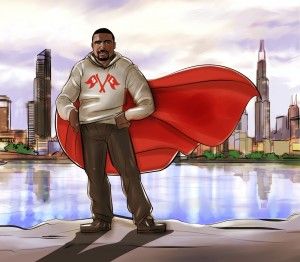Neal Sales-Griffin, Starter League
Founders: Neal Sales-Griffin, Mike McGee
Company Description: Starter League is an immersive, beginner-friendly programming school.
Company Site: http://www.starterleague.com/, Facebook, Twitter
Date of interview: November 2014

Neal Sales-Griffin, Starter League
Art by Brad Lacke
Neal Sales-Griffin is the CEO and co-founder of Starter League, a first-of-kind innovative and immersive programming school in Chicago. For Neal, the motivation, journey and vision of Starter League is not just about teaching people to code – it’s about solving meaningful problems, helping people find happiness and making a positive impact. He believes that you can learn how to code (as he did) and that it will enable you to achieve big things.
On developing his point of view and mission statement:
Growing up, Neal thought the most important problem to solve was making money. However, while studying at Northwestern, he began to develop a different point of view and mantra for how he wanted to approach life. “It’s not because I’m trying to make money. That’s not what’s driving me anymore. I came to this aha moment. I realized that for me it was about happiness – I wanted to enjoy my life and I derived the most happiness when helping people. I enjoyed most of what I did when I was doing something that added value to other folks in the world.”
Once i knew that, I just became very committed to figuring that out every step of the way. I refused to settle by doing something that only felt half right or not right.”
Wake up and ask yourself, ‘What are you doing today?’ Are you on a path where you are inspiring others and enabling others to to be more awesome at whatever they’re trying to do? If not, time to move on. If so, keep plugging away.”
On – why software?:
While in college, he took a job as an analyst for a venture capital firm. He helped assess businesses looking for investors and realized that the majority of the companies were software based. He felt ignorant and frustrated that he was making recommendations about companies that he didn’t fully understand. “That’s the important part (product development). You can’t just skip that part. That wasn’t good enough for me.”
End to end, I wanted to understand it because I knew that a better product and better value can be brought to people if we understand the end to end process. Once I realized that was the missing piece for me, I decided to drop everything. That’s what led me to software.”
On challenges in software development and startups:
What comes naturally to Neal is identifying problems to solve. “There’s no fear that I’m not going to have something meaningful to work on. Honestly, there’s too much. There’s so much about the world that can be improved and made better.”
I’m not going to run out of opportunities to pursue things to make better. I feel like I’ve unlocked some secret that’s hiding in plain sight.”
“The hardest part is actually figuring out how to apply it to something of value. Not just coming up with an idea, but actually producing the solution in a way that accomplishes the goal and produces the outcome the person you’re trying to help ultimately wants. That’s the part I’ve been obsessing over”
I think too many people are focused on the superficial aspects of being in this space. I think there’s something deeper that’s more important – are you charged up by what you’re doing, so that no matter the solution, you’ll stay committed to the problem?”
On Mike as his co-founder:
Throughout past jobs and interactions, Neal confesses that sometimes he “felt like an alien.”
“I’ve developed a set of beliefs about all of this in my life and I found it hard for a lot of people to understand. That’s why I formed a small group of people to interact with – to challenge me, to challenge them and to confide in with these ideas”.
Among this group of confidants and like-minded individuals is his co-founder, Mike McGee. “We had a number of people involved along the way, but Mike and I ended up emerging from the smoke as partners and co-founders. I’m really lucky to have Mike. He’s one of the few people that I’ve worked with in my life who is not only able to match, but even exceed my energy and work ethic. We also have very similar values – they’re very much aligned. That value alignment is the most crucial part of having a partner.”
On why Chicago is special:
“I love Chicago because the culture is still malleable. Chicago is still trying to figure it out and battling different ideas. I’m very interested in being a part of that – of contributing and helping figure that out. I’ve always been interested in shaping culture. I think of some of the stuff I’ve shared with you this morning, and those are some of the beliefs I’d like to share with more people. I’d like more businesses to be created with those values mind – helping people, solving problems, being fulfilled everyday because you’re pursuing your own happiness which is derived from helping others. That’s what I want Chicago to be.”
On most memorable moment:
“That’s tough because I operate in the now. What’s most exciting to me right now is what I’m about to do in 30 minutes – work with those students. If I step outside that for a second, I’d say the opportunity that I had to connect with and befriend the wonderful team over at Basecamp. That meant a lot to me. I can’t believe it happened. It is cool that somebody that I idolized has indicated to me that he believes in me – in what I’m doing, in what we’re doing as a team and why we’re doing it.”
On why Starter League over other opportunities:
Neal had the opportunity to go to Uruguay and work for a company while learning how to code and also was given a job offer to work on the Obama campaign. He turned both of these down to create Starter League. “It boiled down to what’s the most meaningful thing we could be doing right now. What are we in the most unique position to contribute? I knew there were people out there who probably felt the way I felt. They were wrestling with ideas in their heads but felt limited because they couldn’t express what they wanted to make and turn it into something real.”
Our intention is to give people a set of skills along with identifying the intrinsic motivation that allows them to continue growing and developing outside our walls and to make sure what they’re learning is applied to ideas that make the world move forward in a positive way.”
In closing, Neal offers some simple advice on learning and self-improvement – “I just do things. I try to do things I don’t know how to do. That’s how you learn. It’s nothing complicated.”
You can also follow Be Like Peter. updates on Instagram, Facebook and Twitter; or subscribe to our mailing list.
